Staged Resistance
“I hope people of my generation wake up and realize that he really is uh, he’s really gonna change things,” says a young woman in Trump Rally, a play by Sean Pollock that features some two dozen Trump supporters, all portrayed by the same actress, Anna Rock, an impressive performance, but an ambiguous endeavor. Trump Rally was one of nine short new plays in a variety show entitled The Resister Project, its very name signaling that its participants believed that Trump will be changing things for the worse. The show, which ran through Sunday at Kraine Theater in the East Village, featured music, poetry, and stand-up routines as well as the theatre pieces, most of which did not deal directly with Trump or his policies. Many of those that did, such as Trump Rally, weren’t “resisting” the new president so much as depicting the phenomenon of his election.
“We gathered together for catharsis and community,” says Ashley Jacobson, Artistic Director of The Dirty Blondes, the five year old “feminist theatre company with a taste for provocation” that put together The Resister Project.
I think the resistance was in attempting to understand what exactly happened to bring us here. The act of understanding is now an act of resistance because it seems clear that the President-elect and those around him would not encourage critical thinking or empathy or sympathy. After a campaign that was based on prejudice and fear, the antidote to that feels like education, community and empathy. So that’s where The Resister Project started.
It’s important to note that all the artists volunteered their time, and all revenue from the event was donated to the American Civil Liberties Union.
The Resister Project is one of two stage anthologies of new work in New York that I count as part of the Anti-Inauguration. The second of these, entitled Sanctuary, kicks off at the Here Arts Center on the day of the Inauguration, January 20, with The Inaugural Ball, which it describes as “a bevy of feminist/queer/minority artists and performers” gathering together “to celebrate the end of an era and commiserate about the future.” After that, however, Sanctuary continues with a full month of new theatre pieces by more than fifty different artists, a different play nearly every night through February 17. Examples of the work include Jadele McPherson’s La Sirene: Rutas de Azucar, connecting contemporary Cuban-American immigrant experience with black liberation figures, conjurers and spiritual leaders from two hundred years ago, and Next Faggot Nation, which has been developed by The Fossick Collective based on a series of interviews with gay activists, artists, educators, and drag queens about the struggle for LGBT rights.
“Sanctuary is being created to provide a space for communities who have been historically targeted, discriminated against, and marginalized in the United States,” says Andy Salsberg, who is one of the two organizers, in association with Less Than Rent Theater. “It is our hope that Sanctuary provides a welcoming environment for artists, activists, and audiences alike to begin to process how to respond to the radical shifts currently underway in our country.”
Artists have been taking a partisan political stand in ways that may be unprecedented.
Artists have been taking a partisan political stand in ways that may be unprecedented. This was clear immediately after Election Day, as I wrote in “The Trump Effect.” “Art has and will always be a tool for education. And revolution. And resistance,” director Leigh Silverman said in a speech at the time. “We must use our art to make our community impenetrable from what seems like inevitable attacks to come.”
But much of the activism by artists has been away from the stage. The week after the election, actor and playwright Bernardo Cubria ended his popular Off and On: A New York Theatre podcast—hour-long interviews with theatre artists—and created a new podcast What Can I Do?—interviews with anti-Trump activists. “I still love theatre and the theatre podcast will come back,” he says. “I just had to react after the election.”
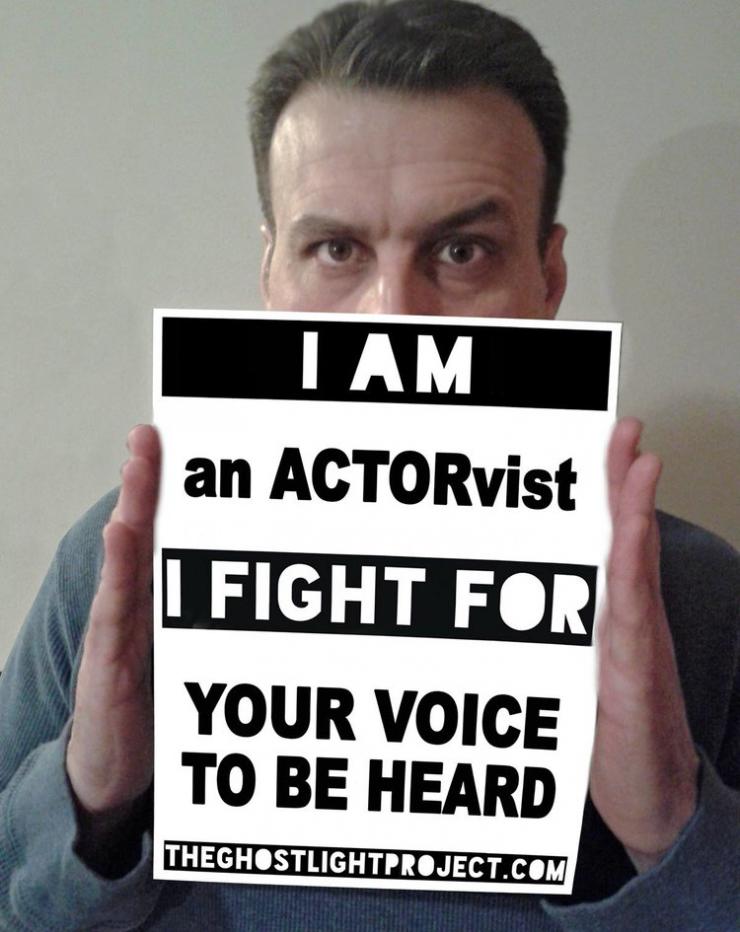
Theatre artists have organized several of the activities that take a stand against the new Presidential administration, most prominently the Ghostlight Project.
While an artist-organized protest movement to shut down museums and performance venues during the Inauguration hasn’t gained traction, the list of performers who declined an invitation to perform at official Inauguration ceremonies certainly exceeds the list of those who accepted—and several, including Tony winner Jennifer Holliday and Springsteen tribute musicians the B Street Band, first accepted and then, after getting flack for their decision, reversed themselves and withdrew.
Theatre artists have organized several of the activities that take a stand against the new Presidential administration, most prominently the Ghostlight Project, which theatre director Saleem Ali described in HowlRound. Hundreds of theatres in all fifty states—some fifty in New York City alone—have signed up to be the site of what is in effect a short street protest with theatrical flare. (Literally—organizers request you bring a flashlight.) But it isn’t theatre.
There has been much attention devoted to the question of what it will mean to be an artist in the time of Trump. But what will the art be like? Will it offer effective resistance to the Trump administration? Solace to the audience? Will theatrical craftsmanship suffer in the face of what Martin Luther King Jr. called the fierce urgency of now? Is this a time that will allow for nuance and complexity? Will any protest plays emerge of lasting value?
Is this a time that will allow for nuance and complexity? Will any protest plays emerge of lasting value?
“I recognize no dichotomy between art and protest,” Ralph Ellison, the author of the novel Invisible Man, said in an interview for the Paris Review in 1955—an era when the interviewer felt completely comfortable to ask Ellison “Isn’t it going to be difficult for the Negro writer to escape provincialism when his literature is concerned with a minority?” Ellison cited the work of artists as diverse as Dickens, Goya, and Sophocles to demonstrate the indisputable connection between art and social protest.
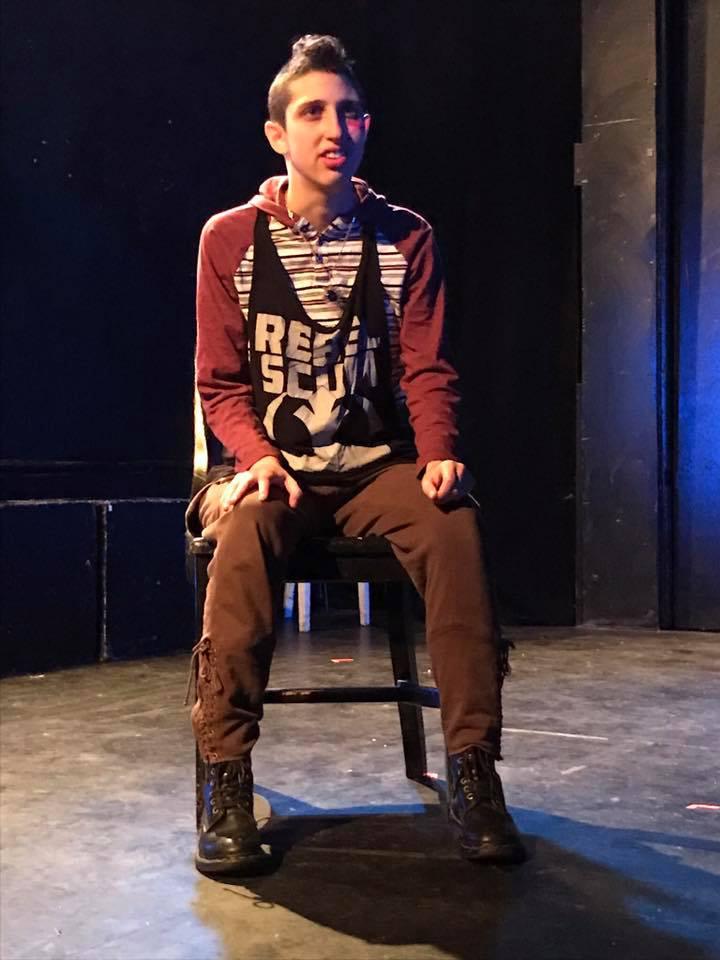
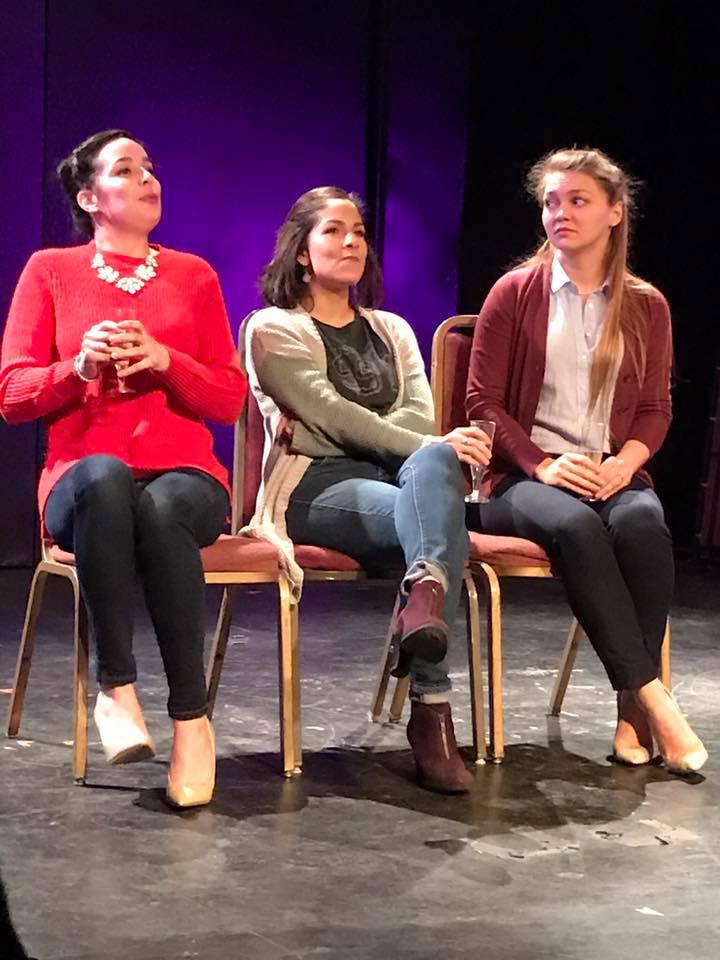
The dozens of young theatre artists behind the short works in The Resister Project would surely claim no Sophoclean power in their dramas, but together the ten-minute plays offered an intriguing preview of what socially conscious theatre might look like in the age of Trump. There were pointed satires, such as Nasty Bitch Radio, an over-the-top comic dystopian horror play by Cat Crowley that pictures a Trumpian America in which sexism has been codified—the government rates women from one to ten based on their sexual allure, and that rating determines what vocations are open to them. The play’s protagonists Elsie and Nadia were rated a two, “which is why we’re on the radio.” In the first line of Ashley Lauren Rogers’s Fight or Flight, Skye, a transgender Hillary supporter portrayed by Bear Spiegel, says “Dad, I’m real sorry I stabbed you,” and then, accompanied by the sound of a heart monitor, explains how the gleeful in-your-face triumphalism of Trump supporters, including their father, finally got to them. In Bridal Boutique, a more temperate play by Julia Specht, an unseen bride-to-be is trying on an expensive wedding dresses while her mother, sister, and future mother-in-law sit on the couch to offer advice. Soon, mother and sister get into a political argument over their votes in the election, an awkward and humorous situation given the presence of the groom’s mother, whom they hardly know. It eventually becomes clear that all three are scared about the future.
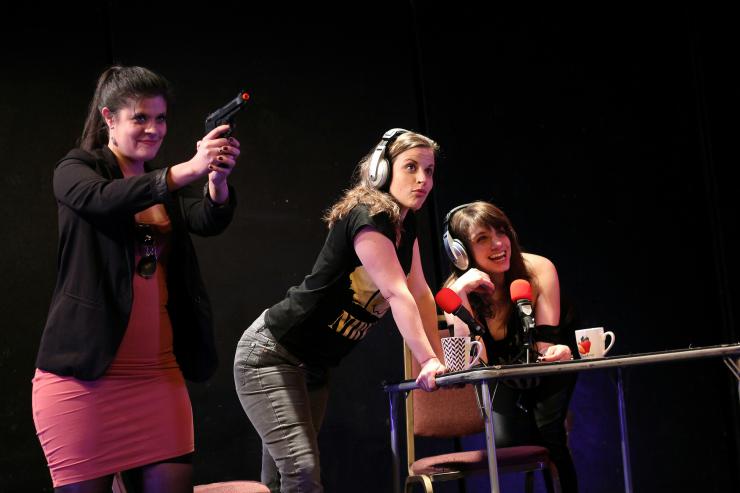
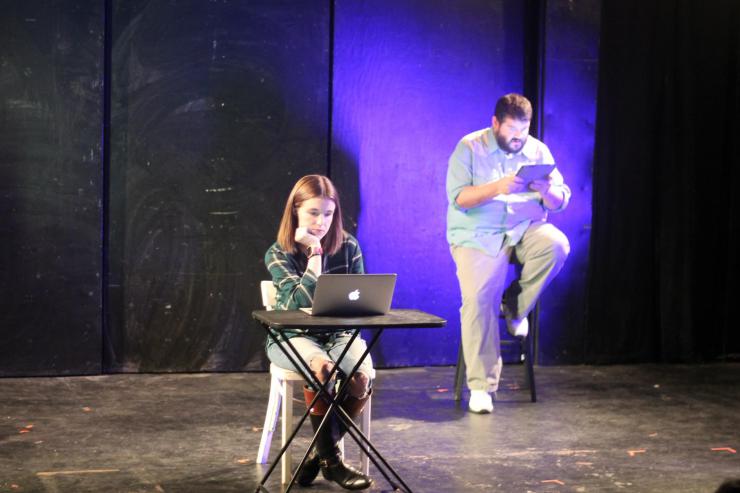
What’s on Your Mind by Ricky Whitcomb is an accomplished documentary-like chronicle of the last nine months of the Presidential election campaign, as seen through a social media mosaic of status updates, likes, shares, comments, replies, and unfriends—which, truth be told, is primarily how (too) many of us experienced Election 2016.
Trump Rally turns out to be more literally a documentary—a stage adaptation of a film documentary by Sean Dunne that playwright Sean Pollock found “a combination of uncomfortable, hilarious and horrifying.” About 90 percent of the play is verbatim dialogue from people attending a Trump rally; Pollock added an anti-Trump character, he says, so that there would be someone with whom the liberal New York audience at the Kraine could sympathize. “I felt it was subversive to see someone, especially a woman like Anna, channel an entire rally of people… and sort of say, we can resist Trump all we want but at the end of the day we're stuck with his supporters.”

The remaining plays dealt with issues such as white supremacy and black oppression that many feel will get worse in the years immediately ahead. The Resister Project, says Jacobson, offered fifty-nine artists, “many of whom were strangers to each before we started,” a way to “channel their fear, anger and helplessness in a positive way.”
What about the audience?
The artistic director also hopes it served audience members, by showing “ways to lead and listen to conversations with people who think differently.” It is interesting that she sees this as having occurred primarily in the talkback discussions at the end of each night. It seems the act of gathering may mean more to audiences than their role as spectator. This is the apparent lesson learned by Emily White, who wrote in an essay about "post-traumatic growth" in HowlRound that her play Lockdown, about the Boston Marathon bombing, was most useful because of the chance for audiences to air their grief in the talk-backs afterwards. The Guys at the Flea Theater in downtown Manhattan after 9/11 served a similar function. I witnessed something similar as well in the production of Edward Albee’s The Death of Bessie Smith at Brooklyn’s Interfaith hospital, a hospital slated to close. The audience discussion afterwards was far less about the play than about the future of Interfaith.
This points to an issue that is of great importance to Bernardo Cubria, he of the former and future theatre podcast. “Theatre could, should, and will be such a powerful tool in the next four years,” he says.
But in order to effect real change we can't pretend the status quo is enough. In New York, plays far too often just preach to the choir. Theatre needs to expand its audience and its reach. This is why theatres like The Working Theatre, INTAR, and The Public's Mobile Unit are even more important today than before. They are taking the plays to the people, not waiting for the typical New York audience.
The same day I attended The Resister Project, I went to see Time of Women, a play by the Belarus Free Theatre based on the true story of three women journalists and activists imprisoned by the Belarusian dictatorship for protesting the fraudulent presidential elections of 2010. The play, I learned, debuted in Belarus in 2014—underground, in a private apartment that remained unknown to the audience until the last moment, since the work of the Belarus Free Theatre is banned in Belarus. Time of Women felt like an accurate depiction of the surreal life under a capricious, power-hungry head of state.
***
Jonathan Mandell’s Newcrit piece usually appears the first Thursday of each month. See his previous pieces here.

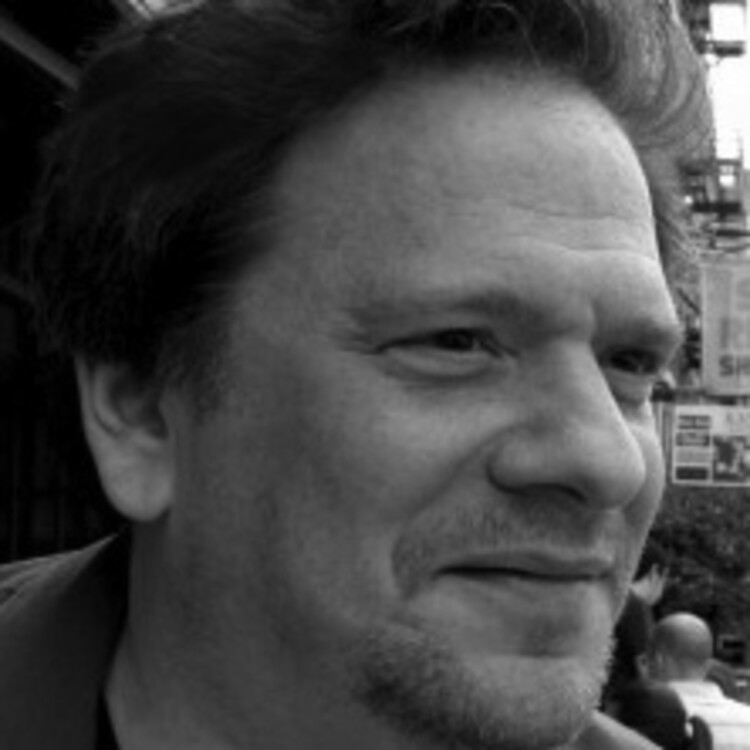
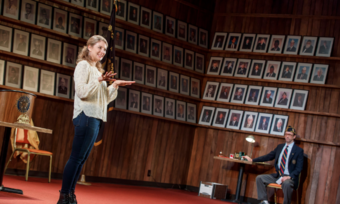

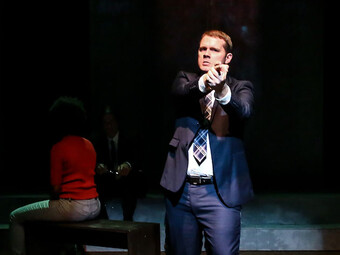

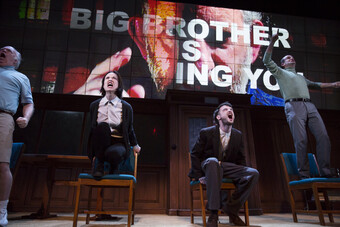
Comments
The article is just the start of the conversation—we want to know what you think about this subject, too! HowlRound is a space for knowledge-sharing, and we welcome spirited, thoughtful, and on-topic dialogue. Find our full comments policy here
Thanks as always Jonathan for a thorough, 3d article.
I was worried a bit at the beginning about the anti-trump focus. And I do think probably starting so strong on that tip discourages some people from reading...even people who are in effect 'anti-trump.'
I worry deeply about 'anti-trump' undermining a lot of already ongoing efforts because, excuse the term, 'band-wagon' activists temporarily activate and associate things like BLM, Standing Rock, feminism, artist activism, anti-fracking etc as 'anti-trump.'
These movements are all greater than Donald Trump, and in fact have nothing to do with him, aside from policies he may try to put in place that then we will need to resist. Associating these movements to 'anti-trump' liberalism undermines all of these efforts which have been going on for generations, in some cases centuries, and eliminates lots of possible coalition building opportunities.
I also wonder how many Ghostlighters will go to the border when the wall is being built and get arrested...or even donate to the relief fund of those who do...
I do know I've seen the left sink to his level much more than rise above it so far...and actually resemble the worst of those who reacted to Obama's presidency.
I do know that there is blazing hypocrisy in claiming that now its "not normal" but that Obama deporting more people than all previous presidents combines, or dropping 26,000 bombs last year alone, or the disintegration of public housing under his watch, or the poison infrastructure in Flint, or the taking of more Native American lands, etc etc etc etc was all normal.
Anyways, those are my responses to your article, and I am glad that you mention the Belarus folks who are actually banned in their own country...because we are behaving with less dignity and strategy than folks who are far worse off than we are...and its an embarrassing time to be an American whichever "side" one might be on.
For sure though, the work was there before Trump, and it will continue long after he's gone...but will people stay engaged?
Thanks (again) for your thanks (again) -- and for your provocative political perspective.
I'm hoping people more knowledgeable (and more passionate) about this stuff than I am will weigh in. But my immediate reaction is to wonder about successful political movements of the past -- the ones that gained a mass following and that effected the change they wanted to see. They may have been started by full-time, committed activists free of hypocrisy -- we call these people "leaders." But has any movement succeeded that didn't win support of the sort of people who are selective and self-centered (and, ok, hypocritical) in their outrage, and will never travel to the border to get arrested?
I remember during ACT UP days, one of the leaders telling me how much they needed what he called the "Les Miz crowd" --he didn't mean fans of Les Miz (necessarily), but the occasionally committed who showed up to fill out the ACT UP demonstrations.
So if these "bandwagon activists" need an orange-haired catalyst, is that something to fill us with contempt -- or with hope?
It's a good question, but my response would be to say that those are not the only two things it could fill us with. I'm not yet filled with hope or contempt...I'm filled with skepticism and a concern for the things I listed above in terms of undermining current movements by misappropriating them into this trending movement...as well as concern for wasting time by engaging this new wave of activism too much and then having it putter out...which is something that happens no matter what one does as an organizer...
But your point is taken, and its something that is being said to me in many forms, that it is up those of us trying to be leaders, that we cannot make it feel like we are lobbing contempt and condemnation into people who aren't maybe thinking things through strategically.
There is a great article here that cites some history that I was reading today...though history is only so valuable, especially given the incredible short history of the industrial age, and the even shorter history of the information/technilogical age we live in. I'm not so sure agricultural age social phenomenon or even early industrial age events, are so relevant to now.
I think the last ten-twenty years are more relevant to figuring out now than most of whats before. But anyways, here's the article as promised:
https://www.theguardian.com...
Excellent article. (I'm reminded of a recent revelation regarding a protest where it was revealed that most of the protestors hadn't bothered to vote!)
Thank you, Brad, for bringing up some several extremely important points (especially that the movements you enumerated [and I have been involved in] have nothing to do with Trump, that the left can sink just as low as the right, and how Obama deported so many people and dropped so many bombs).
I also fear that people are so angry about Trump that they will eventually burn out and become (once again) mostly disengaged from these issues (and other vital ones, such as protecting our food from rapant genetic modifications and the vestages of the TPP, TTIP [atlantic ocean version of TPP], and NAFTA).
Your argument makes sense only if you don't think Trump is a clear and present danger to American democracy -- which apparently you don't, but the (new crop of?) protesters just as apparently do.
My 101-second video of the Ghostlight Project ceremony, focusing on the one in front of the Cherry Lane theater where they read the "huddled masses" poem in Spanish and English https://newyorktheater.me/2...
Stageworks Northwest Theatre in Longview, WA, is opening the conversation in our community with INTO THE STORM, opening Jan. 28.
I strongly feel that it's the urgent responsibility of the Fountain Theatre as an organization, we as a theatre community, and all of us as theatre artists to rise up and speak out on what's happening right now and what's looming ahead, in our cities, and our nation. The Fountain Theatre in Los Angeles is already shouting our warning with BUILDING THE WALL, the world premiere of a new play by Tony Award and Pultizer Prize winning playwright Robert Schenkkan, opening March 18. https://intimateexcellent.w...